- Home
- Karen Traviss
Matriarch Page 13
Matriarch Read online
Page 13
“James and I have spent a lot of time talking,” said Deborah. “I won’t pretend it’s been easy. But he’s reached some degree of understanding.”
“And Rachel?”
“She misses Josh, and she misses you.”
“Have you told her what I did?”
“Of course not. One day I will, though, so that she understands.”
Despite generations spent among humans—more time than he had even spent among his own kind—Aras still found it odd that human children couldn’t absorb reality in the same way as wess’har youngsters. Giyadas could reason much as Nevyan could; she was simply aware of fewer things, and as she experienced them, she absorbed them. Human children existed in a state of semi-sentience for years.
Deborah’s tent was strewn with branches painted red and green. A candle stood on a saucer, its flame guttering occasionally as a draft caught it. It was nearly Christmas and Aras knew how much time they spent preparing for the religious festival. They took it seriously. It was some kind of birthday event, although Shan insisted it was just a Pagan midwinter ceremony dressed up in a new theology like many others. Aras didn’t mind. It was all untruth to him.
“Rachel painted all these branches,” said Deborah.
“Where is she?” Aras missed the child. She’d always drawn pictures for him, strangely stylized and wholly inaccurate, and he wondered if that was how she perceived the world. “Where’s James?”
“We’ve set up a schoolroom in one of the horticulture tunnels. It solves a few heating problems.” She handed Aras a cup and poured some liquid into it. The scent of sage tea filled the tent and briefly overpowered the smells of the camp—garlic, sewage and burning. “James teaches in the mornings and works on the crops for the rest of the day.”
“And you’ve taken over the leadership.”
“Not intentionally.”
“I don’t recall women leading the community before.”
“That always confused you, didn’t it?”
“My society is run by matriarchs, just as the Eqbas and the ussissi are.” He sipped the tea. “Will you do things differently? What do you intend to do when you return to Earth? I know you’ll be planning.”
Deborah looked lost for a moment. “We’re discussing that.”
“And?”
“We’ve served our purpose when we return the gene bank to Earth and the Eqbas begin restoring the environment. All we can do is carry on living a respectful life in the service of God.”
Aras groped for a focus in that. We’ve served our purpose. Life without purpose alarmed him. “But how will you live?”
“As we’ve lived here.” Deborah reached for an old data device, the kind that they no longer used on Earth. It was even older in design than Shan’s swiss. She displayed a map on its small screen. “I believe we’ll end up in Australia. We’ve been wondering where we might settle. At least we speak the same language, more or less.”
“Earth has changed a great deal since your ancestors left.”
“Yes, we know. That’s why we’re going back.”
The colonists seemed to take upheaval relatively calmly. A few had resisted the evacuation of Constantine, but it was just two families, and they’d succumbed to the pathogen that the wess’har had released on the planet to make it uninhabitable for humans. Aras was sure this had something to do with the colonists’ unproven belief in a more desirable life beyond death. It was a strange gamble.
“You have a great deal of catching up to do.”
“Ah, so has Earth,” said Deborah. “It’ll be a time of huge change for everyone.”
Aras fought with his curiosity for a moment. He’d never seen a whole ecology restored before. At the back of his mind, fragments of Shan’s memories of Earth nudged him and told him he wanted to see the planet and the changes the Eqbas would make. He felt a passionate responsibility; and although it was an emotion transferred from Shan’s memory, it was still powerful, so close to his sense of stewardship of Bezer’ej that it felt like his own.
He thought of the macaws that Shapakti had restored from the gene bank.
“The Eqbas have re-created some species.”
Deborah’s face relaxed and for a moment she looked much as she had been three years ago, before the gethes had arrived in Thetis and the chain of destructive events had begun. “It worked?”
“Did you think it wouldn’t?”
“I shouldn’t have doubted. But it was always possible that we hadn’t maintained the storage conditions properly.” She seemed distracted from her loss for a moment. “What did they re-create?”
“Blue and gold macaws.”
“Oh.”
“They’re extraordinary. They’re so vivid.” Aras felt that sense of amazement again at seeing life from Earth that was utterly unlike gethes, independent of humans and with its own way of life. “They use human language as well as their own.”
Deborah’s eyes filled with tears but she smiled. She seemed to be at that tipping point of intense emotion where humans either laughed or cried, and sometimes did both.
“Josh would have been so excited.” She clasped her left fist in her hand. All these humans had seen of their homeworld was food crops, a few pollinating insects and rats. Earth’s ecology was as alien to them as it was to Aras: and according to Eddie there were no wild macaws left on Earth. “May I see them?”
Aras didn’t feel guilty, although he would always regret that Josh had to die. He missed him. And Deborah was a friend, and not responsible for what Josh had done. So making her a little happier was not guilt. “Of course,” he said. “I’ll talk to Shapakti.”
“It’s real, isn’t it? It’s really happening.”
“Yes. It’s real.”
“Without the Eqbas, could we have carried out that degree of restoration?”
Aras thought of gethes and their technology, and their political will to change their greedy, destructive habits. “No,” he said. “I doubt it.”
“Then the intervention of the Eqbas was essential.”
Where is this leading? “I would say so.”
Deborah’s face was fine boned and her eyes were dark and slanted. Her point of focus now seemed to be to one side of him, on nothing at all.
“This helps me make sense of Josh’s actions…and yours.”
“Why?” No, don’t ask. You won’t understand.
“If Christopher Island hadn’t been bombed, the Eqbas would never have come here. It’s part of a purpose.”
Aras was right. He didn’t understand. He drained his cup, fighting hard against his wess’har instinct to explain that she was wrong and that there was no greater plan in all this. Humans were superb at pattern recognition and prediction. They were so good at it, in fact, that they saw patterns where none existed and imposed them for comfort, to convince themselves of some benign plan unknown to them that would explain one day why life was so painful. They were still content not to know that imagined purpose. And sometimes they were led by the recognition of patterns that proved to be utterly wrong and totally destructive.
A coping mechanism. An evolutionary quirk, not a perception of reality.
Aras wanted to tell her that events happened because they were consequences of other actions and that only causality connected everything. Some humans seemed not to know where they were in linear time. But he knew Deborah believed that God intervened and placed events in order to offer humans choices and consequences as incentives.
“It’s fortunate that the Eqbas have expertise in genetic manipulation,” he said carefully.
“But you left Eqbas Vorhi ten thousand years ago. They would never have come to this system, would they?”
“That’s true.” And delusional. But if this helped gethes make restrained choices…did it matter how they reached them? Outcomes. Motive was irrelevant. He ventured into her framework of logic. “The destruction of Ouzhari was a catalyst. If you want Earth restored sooner rather than later, the involvement o
f Eqbas Vorhi is the best way I know to achieve it. And your God isn’t omnipotent after all, perhaps he recognized a need to enlist their intervention.”
If that helped her deal with Josh’s death, that was fine too. Aras didn’t require that gethes thought as he did. He just wanted them to act in a responsible and civilized manner. How they managed that was up to them.
Deborah’s discomfort at his doubt in her God was visible, though. She changed tack. “Tell me, how did Lindsay Neville cope at the end? She seemed to find some peace in prayer.”
There was no point in deceiving Deborah, and for all his recent practice, Aras was still a literal wess’har with no fear of the consequences of knowledge.
“She’s alive,” said Aras. “And so is Dr. Rayat.”
Deborah’s expression was a total blank and her lips parted a little. Aras waited for her to speak again. She just stared at him. Eventually he filled the silence.
“The bezeri wanted someone to live among them and help them,” he said. “Lindsay and Rayat seemed appropriate, and c’naatat enabled them to do it.”
“You contaminated them.”
“Yes.” Aras waited for her to ask why Josh had to die but they were spared. He had his explanation ready, including the shockingly altered life they would lead, which would no doubt fit her ideas about eternal damnation. He didn’t need to mention Vijissi as well. “It was deliberate.”
She closed her eyes for a moment. “I’m glad you didn’t do that to Josh.”
It surprised him. Sometimes he didn’t know humans as well as he thought. But Deborah thought Josh was now with God, which was where they all wanted to be in the end. Aras hadn’t felt that at all when he believed Shan was dead. She was simply gone, and the world had been too painful to bear without her.
“If I acquired some food supplies, would you accept them?” he asked.
“That’s kind of you, Aras.”
“And contact me when you want to visit the macaws.” He took Shan’s swiss from his pocket. He hadn’t returned it to her yet. “I can receive your messages.”
There was nothing more to say. They looked at one another and Aras found he had no more questions. He turned to go, disappointed that he hadn’t seen Rachel, and ducked to get out of the tent.
“I’ll walk you back to the boat,” said Deborah.
“No need.” The worst he could face was abuse. “And let me know if you want help from the marines.”
Aras strode down the foot-worn path between the tents as the fabric snapped and whipped in the wind. He knew every one of the colonists in the camp; now he had fallen from grace with them, and it bothered him not because he wanted their approval but because he didn’t like to be reminded of how fragile humans’ affections were. Wess’har didn’t have feuds or abandon their families. Attachments were for life.
You’re still worried that Shan’s the same. You’re still worried that she’ll do what humans do and choose between you and Ade, instead of accepting you both like a real isan should.
Aras’s human side, scavenged by his c’naatat from viruses and bacteria and skin cells, was a little nagging voice of doubt. He ignored it. Shan was, he knew, as good as her word. She would never abandon him again.
“Aras.” The voice came from behind him. “Aras!”
Movement caught his peripheral vision. He wouldn’t let the colonists’ hatred touch him. That was their problem to deal with: he made himself immune, thinking of Shan and Ade.
“Aras!”
The man’s tone was urgent. Aras turned. It was John, John for whom he had once made glass pens, John who had earlier turned his back on him. His wife stood beside him.
“We’re sorry, Aras,” said John. “And we’re sorry for what happened to the bezeri. Go careful, my friend.”
Deborah’s words had hit their target. Humans were at least capable of change with sufficient motivation. Aras suspected it was more to find favor with their god, the one who said they had to forgive, than out of a genuine change of heart.
But that was motive. And motive didn’t matter.
These had been his friends. He liked them, and he felt better when they weren’t hostile towards him.
“You too, John,” said Aras. “You too.”
7
So the Federal European Union accuses Australia of breaching UN treaties by unilaterally inviting the Eqbas Vorhi mission to its territories. Is this the same FEU that issued a unilateral invitation to the isenj delegation less than two years ago? And would the FEU explain the difference? Perhaps it’s that superpowers can flout international treaties with impunity. Let me just say this. Any act of economic or military aggression against our Muslim brothers and sisters in Australia, New Zealand, Australian Antarctica or any of the Pacific Rim States will be treated as a hostile act against us, too.
JEAN ARLENE,
President, African Assembly
in an interview
Bezer’ej: near Ouzhari island
Lindsay stared at the squirming translucent tubes clutched in one of Saib’s tentacles.
I have to get through this.
She was ravenous. That was c’naatat, she knew: all that cellular remodeling expended a lot of energy. She felt hot, even though the water was cold, and her body demanded calories. And she could adapt to anything. And that meant…she could eat anything.
Oh God.
Saib shimmered with radial streaks of violet and gold and the lamp’s audio boomed. You must learn to trap your own. You might prefer the weed.
Lindsay was sure she would. Rayat reached past her and grabbed one of the tubes. “What is it?” he said, and hesitated for a second before shoving it into his mouth and chewing hard.
She was sure he’d vomit up. His eyes screwed up for a reflex second as he gagged on the thing but he kept it down.
Rayat always had to win, even against tubes.
It grows on the rocks, said Saib. It is perhaps a weed but it acts like an animal. It moves between rocks.
“Fine,” said Rayat. “Because if I don’t eat something solid then c’naatat is going to make me filter krill or mud or something. I want to keep chewing, thanks.”
Lindsay steeled herself and reached for a tube. Do it fast. It felt horribly cold and gelatinous in her mouth but it tasted of nothing. Somehow that was the worst part. She swallowed hard and struggled against her gag reflex.
“How much of this do we need to eat?” she asked.
“Eat when you’re hungry and stop when you’re not.”
“Thanks, doctor. Great. I might never have worked that out on my own.”
But he was right. Her instinct told her to eat as much as she could when she found food. Whether it was her human hypothalamus telling her to gorge in an emergency or c’naatat making the decisions for her, she decided to obey it. Clustered on the rocks were writhing translucent gold tubes like the ones Saib had gathered. She made her way over to them—and it was becoming far more natural to move in the water now, a combination of swimming and touching down on the seabed every few meters—and reached out.
She expected them to shrink from her hand like anemones. But they scattered.
She lunged at them and managed to grab a handful. Plants, she told herself. Plants, plants, plants. She crammed them into her mouth and shut out every conscious thought that said food had to be dead and cooked.
She’d eaten oysters once and vomited.
“I’ll stick to chasing weed,” said Rayat. “Until I develop the ability to move efficiently in water.”
“You reckon you will?”
He nodded emphatically. “You can see how this thing works. It fits you to survive in your environment. It wants you to stay alive, because it depends on you in some way. It optimizes you.”
“It survives in soil. Why does it need us?”
Rayat was a pharmacologist, a scientist. He would be useful at last. “Lots of parasites need a host for certain phases of their life cycle. Some even need hosts for transport, nothing else
.”
“Maybe I shouldn’t think about this.”
“Maybe you should. I want c’naatat to give me those damn lights so I can talk to the bezeri without the lamp. It probably won’t last forever.”
“Shan picked up the bioluminescence. She couldn’t speak the language, though.”
“Did she ever try?”
“I don’t know.”
“How exactly did she acquire it?”
“No idea.”
Saib moved, shooting a powerful jet of water and sending silt pluming in clouds. Hurry. If you do not want to eat, then work. Fetch more maps. The podship will come soon.
Rayat held his hand out for the signal lamp. Lindsay paused for a moment and then decided that if he tried to keep it, Saib would probably take it from him anyway. The bezeri needed to communicate with them too.
She put it in his hand. “Go ahead.”
Rayat aimed the lamp at Saib. “How can I get some cells from you?”
I do not understand.
“I want to be able to use light like you do. I need some cells from you, but I mustn’t break your skin or I might infect you.” Rayat was looking over Saib’s mantle, searching at a careful distance. “Can you scrape off any skin?”
Saib didn’t respond. He hung in the water motionless for a moment, and then gathered up his tentacles tight to his body and shot off with a powerful jet of ejected water. He disappeared into the darkness. The two remaining bezeri waited.
“Okay, you’ve pissed him off now.” Lindsay kicked up into the water and swam for the repository again. “Come on, let’s shift those maps.”
It was hard work. Lindsay wanted it to be. She’d brought these creatures to the brink of extinction, through her own stupidity, and she didn’t deserve a second of respite. And the harder it was, the less she thought.
Lindsay wondered for a moment how long her clothing would survive immersion in saltwater. At least she didn’t have to worry about hygiene and latrines any longer. The things she found comfort in now astounded her.

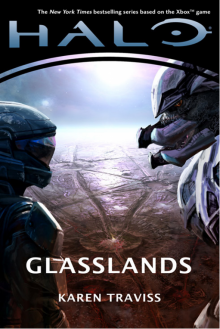 Halo: Glasslands
Halo: Glasslands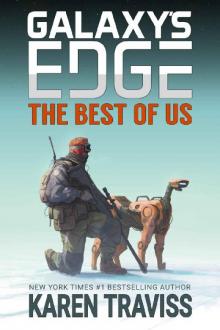 The Best of Us
The Best of Us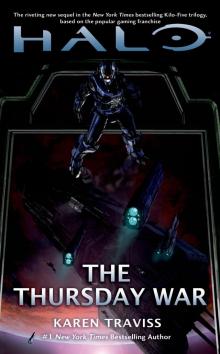 Halo: The Thursday War
Halo: The Thursday War Ally
Ally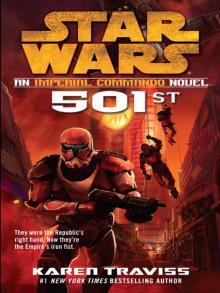 501st: An Imperial Commando Novel
501st: An Imperial Commando Novel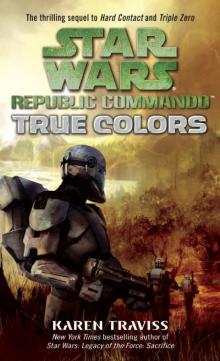 True Colors
True Colors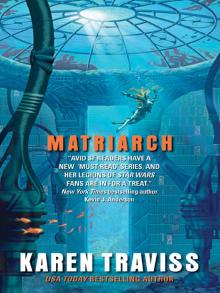 Matriarch
Matriarch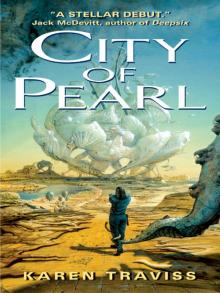 City of Pearl
City of Pearl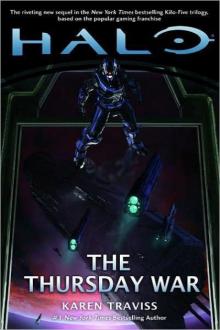 The Thursday War
The Thursday War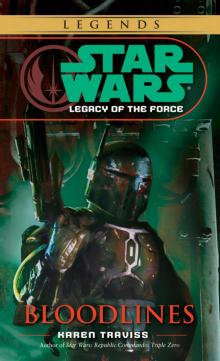 Bloodlines
Bloodlines Gears of War: Anvil Gate
Gears of War: Anvil Gate Crossing the Line
Crossing the Line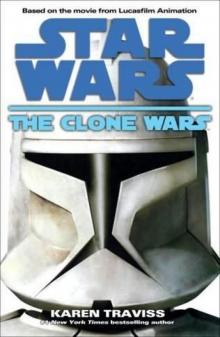 Star Wars - The Clone Wars 01
Star Wars - The Clone Wars 01 Omega Squad: Targets
Omega Squad: Targets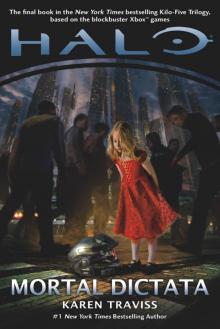 Halo®: Mortal Dictata
Halo®: Mortal Dictata Hard Contact
Hard Contact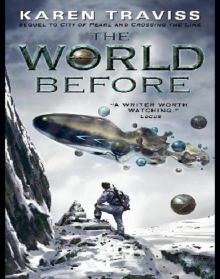 The World Before
The World Before Order 66
Order 66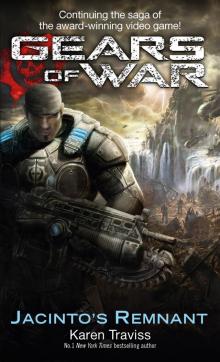 Gears of War: Jacinto's Remnant
Gears of War: Jacinto's Remnant Sacrifice
Sacrifice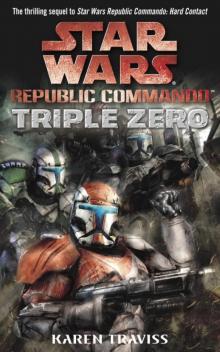 Triple Zero
Triple Zero Gears of War: The Slab (Gears of War 5)
Gears of War: The Slab (Gears of War 5) NEW JEDI ORDER: BOBA FETT: A PRACTICAL MAN
NEW JEDI ORDER: BOBA FETT: A PRACTICAL MAN Going Grey
Going Grey Star Wars: Boba Fett: A Practical Man
Star Wars: Boba Fett: A Practical Man Revelation
Revelation Coalition's End
Coalition's End No Prisoners
No Prisoners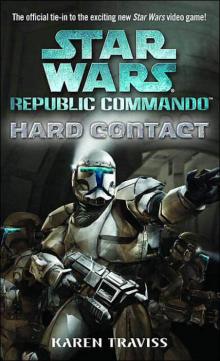 Star Wars Republic Commando: Hard Contact
Star Wars Republic Commando: Hard Contact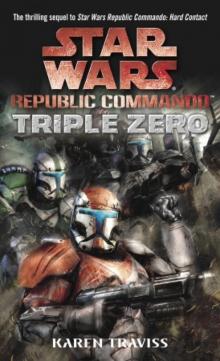 Star Wars: Republic Commando: Triple Zero rc-3
Star Wars: Republic Commando: Triple Zero rc-3 The Clone Wars
The Clone Wars The Clone Wars: No Prisoners
The Clone Wars: No Prisoners Star Wars: Republic Commando: Hard Contact rc-1
Star Wars: Republic Commando: Hard Contact rc-1 Judge
Judge Omega Squad: Targets rc-4
Omega Squad: Targets rc-4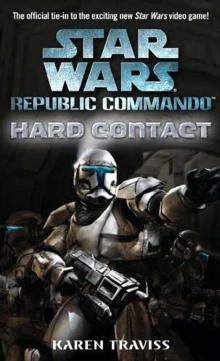 Star Wars - Republic Commando - Hard Contact
Star Wars - Republic Commando - Hard Contact